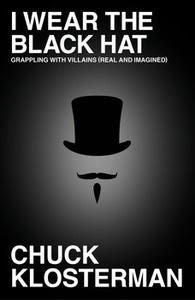Take a photo of a barcode or cover
Chuck Klosterman's writing style is a pleasure to read. After having read Sex, Drugs, and Cocoa Puffs: A Pop Cultural Manifesto, I instantly dubbed him one of my favourite comical nonfiction writers (in that he is writing the truth and it is funny, but he is not exactly being a comedian). Now, he has chosen to write about villains, all kinds, mostly nonfictional but a few fictional ones, too, using the argument that a villain can be boiled down to the person who knows the most and cares the least. You'll read about all kinds of things in this book, starting with Machiavelli and the notions associated with him to the Clinton-Lewinsky scandal, from the problem with the Eagles (and what that has to do with Taylor Swift) to a compare-and-contrast examination of how Kareem Abdul-Jabbar and OJ Simpson are so similar yet so different. Perez Hilton, Kim Dotcom, and Wikileaks founder Assange are all discussed not long after the essay on Sandusky. You read about Nancy Botwin of Weeds and Walter White of Breaking Bad and learn why it is that suddenly we like drug dealers, but don't like drug users. What makes one villainous and the other innocent, or at least, neutral? The book starts off with an examination of how devious tying women to the railroad tracks became known as the ultimate evil deed, asking what makes other people evil or not evil, but it ends off on a self-reflective note, a perfect way to end frankly, short and sweet and slightly abrupt, but with the closure and finality that wraps up the details. Quite frankly, at a mere 200 pages, I wish I Wear The Black Hat was longer. Ultimately, the charisma stems from Klosterman's writing; his wit is most amusing. I discovered this was so as I realized that, had it been anyone else, I wouldn't care about sports commentary or music criticisms, but through his particular lens, I appreciate what I'm learning. For anyone who likes to learn and laugh simultaneously, Klosterman is the writer for you. I would definitely recommend I Wear The Black Hat.
Reading Klosterman is a little like staying up all night listening to your smartest friend ramble about whatever he's got on his mind these days -- and I mean that in the best possible way.
It took me six months to finish this because I just never felt like reading it. The author has opinions about a lot of things he knows nothing about but decided to share them with the world anyways. I mean, most of the issues he has doubts about or questions are issues feminists have discussed for decades and yet he completely dismisses the feminist answer (in some cases he literally says this). The author basically lists all the things that make me distrust male authors. For example, he talks about the limits of humor and how people get offended easily. He also says he's apolitical, but immediately after proceeds to talk about how he pitied Sarah Palin because people were mean to her on Twitter, and he also denies that a politician's actions or words could have consequences amongst their followers. This only proves that he's a privileged white man who refuses to acknowledge his own privilege and bias. He also thinks he's so interesting that he spends about 10 pages listing all the music bands he hated in his youth without getting to any point. Honestly, he just comes out as a narcissist who thinks his opinions are the only ones that are valid, even when the issues he raises have been discussed (and there's mostly a consensus) within feminist and activist communities. But this isn't a researched book about how we grapple with villains in society, it's just a list of a bunch of his own opinions about particular people and events. However, if you're going to write a book, your opinions need to be based on something other than your own personal hunches. (Or, based on the fact that this was published, maybe not).
I love Klosterman and everything about this book is exactly why. No one thinks the way Klosterman does, and more importantly no one makes me think about things the way Klosterman does. Whether I agree with him or thought he was way out in left field, this collection of works on pop culture villains was just a brilliant piece of work, one that he was perfect to write.
funny
lighthearted
reflective
relaxing
medium-paced
Not my favorite of his, but interesting. I always feel like I learn so much.
I don't love Klosterman's writing, but I think I like his thinking. And I really like thinking about villains, and how the actual bad behaviors (or lack thereof) are only part of what defines them as villainous in our minds. A thoughtful, thought-provoking series of essays.
I Wear the Black Hat was another great addition to Klosterman's canon. It was a return to the attention grabbing writing/subject matter that was present in Sex, Drugs, and Cocoa Puffs, but it had a mature and sincere tone that has developed as he has grown as a writer. While I thoroughly enjoyed Sex, Drugs, and Cocoa Puffs (I first read it when I was in my early 20's), I feel that my connection with it would be different now that I am on the cusp of 30. I Wear the Black Hat isn't just an exploration of society's obsession or understanding of villains, it's also an opportunity for some humorous self analysis.
I realize there are people who dislike Klosterman's style of writing. Having spoken to some friends of mine who aren't huge fans, it seems that the general consensus is that he comes off as a pretentious jerk who belittles his readers by pontificating about arbitrary topics and insinuating that their opinions don't matter. However, I can't help but disagree. Does Klosterman have his opinions about the topics he writes about? Certainly. Does he use academic language to discuss topics that appear to be "non-academic"? Definitely. But here's the thing, that's what makes his writing so engaging and fun. I think the problem lies in how people read his writing: you just can't take it too seriously. I equivocate his writing to the scripts used for the Daily Show or the Colbert Report. Are John Stewart and Stephen Colbert caricatures of a set of ideals held by society? Yes. When they portray these caricatures, are there moments when they break the mold and expose some moments of "truth"? Yes. I feel the same can be said about Klosterman's writing. It's opinionated, it's candid, it's funny, and in some cases, it's true. I Wear the Black Hat is Klosterman at his best.
I realize there are people who dislike Klosterman's style of writing. Having spoken to some friends of mine who aren't huge fans, it seems that the general consensus is that he comes off as a pretentious jerk who belittles his readers by pontificating about arbitrary topics and insinuating that their opinions don't matter. However, I can't help but disagree. Does Klosterman have his opinions about the topics he writes about? Certainly. Does he use academic language to discuss topics that appear to be "non-academic"? Definitely. But here's the thing, that's what makes his writing so engaging and fun. I think the problem lies in how people read his writing: you just can't take it too seriously. I equivocate his writing to the scripts used for the Daily Show or the Colbert Report. Are John Stewart and Stephen Colbert caricatures of a set of ideals held by society? Yes. When they portray these caricatures, are there moments when they break the mold and expose some moments of "truth"? Yes. I feel the same can be said about Klosterman's writing. It's opinionated, it's candid, it's funny, and in some cases, it's true. I Wear the Black Hat is Klosterman at his best.





